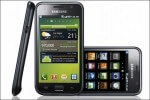 Modern smartphones are expensive, relatively fragile and battery-hungry. Consequently, they’re pretty much useless in any tough emergency situation. Todd talks to Christian Scheder of SpareOne about their solution to the problem.
Modern smartphones are expensive, relatively fragile and battery-hungry. Consequently, they’re pretty much useless in any tough emergency situation. Todd talks to Christian Scheder of SpareOne about their solution to the problem.
The SpareOne emergency phone is a mobile phone that runs off a standard AA battery rather than a rechargeable one more usually found in a mobile phone. While this gives 10 hours of use from a single battery, the benefit in an emergency is that the battery can simply be swapped for another. Further, Energizer Ultimate Lithium AA batteries have a storage life of 15 years so this phone can be stored with batteries for up to 15 years, ready to go. The SpareOne is supplied in a waterproof bag that further protects the phone during storage and any wet emergencies.
The phone takes standard GSM SIMs for ordinary calls but the SpareOne can also call the emergency services even without a SIM card. If you are interested, the SpareOne is available now for $99 from the website.
Interview by Todd Cochrane of Geek News Central for the TechPodcast Network.
Support my CES 2024 Sponsor:$11.99 – For a New Domain Name cjcfs3geek
$6.99 a month Economy Hosting (Free domain, professional email, and SSL certificate for the 1st year.) Promo Code: cjcgeek1h
$12.99 a month Managed WordPress Hosting (Free domain, professional email, and SSL certificate for the 1st year.) Promo Code: cjcgeek1w
Support the show by becoming a Geek News Central Insider
Podcast (specmedia): Play in new window | Download | Embed
Subscribe: Apple Podcasts | Email | RSS



 When the iPhone came along in 2007, many people were immediately disappointed, including me, that it was tied at the hip to AT&T. In retrospect, that set the stage for what was to follow.
When the iPhone came along in 2007, many people were immediately disappointed, including me, that it was tied at the hip to AT&T. In retrospect, that set the stage for what was to follow. If a CDMA version of the iPhone exists, and the rumors are true that it will eventually show up for sale at Verizon, this has to mean that it’s already being tested. Will the CDMA iPhone pass the Verizon tests?
If a CDMA version of the iPhone exists, and the rumors are true that it will eventually show up for sale at Verizon, this has to mean that it’s already being tested. Will the CDMA iPhone pass the Verizon tests?